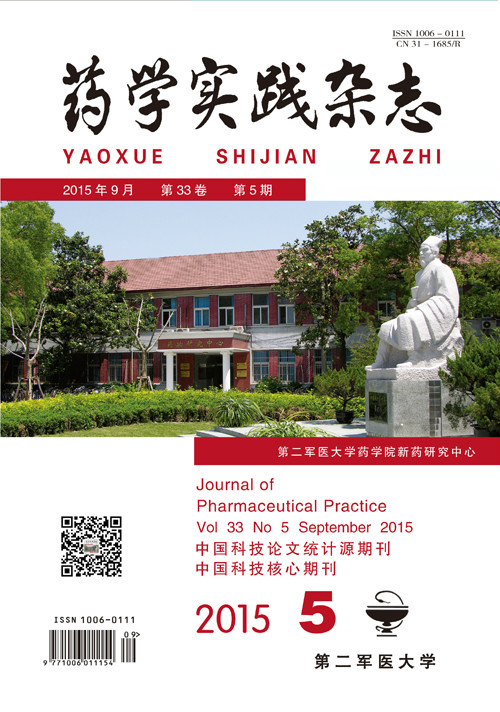|
[1]
|
Molodecky NA,Soon IS,Rabi DM,et al. Increasing incidence and prevalence of the inflammatory bowel diseases with time,based on systematic review[J].Gastroenterology,2012, 142(1):46-54. |
|
[2]
|
Dave M,Higgins PD,Middha S,et al. The human gut microbiome: current knowledge,challenges,and future directions[J].Transl Res,2012,160(4):246-257. |
|
[3]
|
Huttenhower C,Kostic AD,Xavier RJ. Inflammatory bowel disease as a model for translating the microbiome[J]. Immunity,2014,40(6):843-854. |
|
[4]
|
Morgan XC,Segata N,Huttenhower C. Biodiversity and functional genomics in the human microbiome[J]. Trends Genet,2013,29(1):51-58. |
|
[5]
|
Scaldaferri F,Gerardi V,Lopetuso LR,et al. Gut microbial flora,prebiotics,and probiotics in IBD: their current usage and utility[J]. Biomed Res Int,2013,2013:435268. |
|
[6]
|
Hooper LV,Littman DR,Macpherson AJ. Interactions between the microbiota and the immune system[J].Science,2012,336(6086):1268-1273. |
|
[7]
|
Boudeau J,Glasser AL,Masseret E,et al. Invasive ability of an Escherichia coli strain isolated from the ileal mucosa of a patient with Crohn's disease[J].Infect Immun,1999,67(9):4499-4509. |
|
[8]
|
Rolhion N,Darfeuille-Michaud A. Adherent-invasive Escherichia coli in inflammatory bowel disease[J]. Inflamm Bowel Dis,2007,13(10):1277-1283. |
|
[9]
|
Allen-Vercoe E,Jobin C. Fusobacterium and Enterobacteriaceae: important players for CRC?[J].Immunol Lett,2014,162(2PA):54-61. |
|
[10]
|
Allen-Vercoe E,Strauss J,Chadee K. Fusobacterium nucleatum: an emerging gut pathogen?[J].Gut Microb,2011,2(5):294-298. |
|
[11]
|
Ohkusa T,Okayasu I,Ogihara T,et al. Induction of experimental ulcerative colitis by Fusobacterium varium isolated from colonic mucosa of patients with ulcerative colitis[J]. Gut,2003,52(1):79-83. |
|
[12]
|
Strauss J,Kaplan GG,Beck PL,et al. Invasive potential of gut mucosa-derived Fusobacterium nucleatum positively correlates with IBD status of the host[J]. Inflamm Bowel Dis,2011,17(9):1971-1978. |
|
[13]
|
Kostic AD,Chun E,Robertson L,et al. Fusobacterium nucleatum potentiates intestinal tumorigenesis and modulates the tumor-immune microenvironment[J]. Cell Host Microb,2013,14(2):207-215. |
|
[14]
|
Kitajima S,Morimoto M,Sagara E,et al. Dextran sodium sulfate-induced colitis in germ-free IQI/Jic mice[J]. Exp Anim,2001,50(5):387-395. |
|
[15]
|
Kamada N,Chen G,Núez G. A complex microworld in the gut: harnessing pathogen-commensal relations[J]. Nat Med,2012,18(8):1190-1191. |
|
[16]
|
Llopis M,Antolin M,Carol M,et al. Lactobacillus casei downregulates commensals' inflammatory signals in Crohn's disease mucosa[J]. Inflamm Bowel Dis,2009,15(2):275-283. |
|
[17]
|
Varela E,Manichanh C,Gallart M,et al. Colonisation by Faecalibacterium prausnitzii and maintenance of clinical remission in patients with ulcerative colitis[J]. Aliment Pharmacol Ther,2013,38(2):151-161. |
|
[18]
|
Cadwell K,Patel KK,Maloney NS,et al. Virus-plus-susceptibility gene interaction determines Crohn's disease gene Atg16L1 phenotypes in intestine[J]. Cell,2010,141(7):1135-1145. |
|
[19]
|
Trojanowska D,Zwolinska-Wcislo M,Tokarczyk M,et al. The role of Candida in inflammatory bowel disease. Estimation of transmission of C. albicans fungi in gastrointestinal tract based on genetic affinity between strains[J]. Med Sci Monit,2010,16(10):CR451-457. |
|
[20]
|
Iliev ID,Funari VA,Taylor KD,et al. Interactions between commensal fungi and the C-type lectin receptor Dectin-1 influence colitis[J]. Science,2012,336(6086):1314-1317. |
|
[21]
|
Morgan XC,Tickle TL,Sokol H,et al. Dysfunction of the intestinal microbiome in inflammatory bowel disease and treatment[J]. Genome Biol,2012,13(9):R79. |
|
[22]
|
Atarashi K,Tanoue T,Oshima K,et al. Treg induction by a rationally selected mixture of Clostridia strains from the human microbiota[J]. Nature,2013,500(7461):232-236. |
|
[23]
|
Duncan SH,Hold GL,Barcenilla A,et al.Roseburia intestinalis sp. nov., a novel saccharolytic, butyrate-producing bacterium from human faeces[J]. Int J Syst Evol Microbiol, 2002,52(Pt 5):1615-1620. |
|
[24]
|
Khan KJ,Ullman TA,Ford A,et al. Antibiotic therapy in inflammatory bowel disease: a systematic review and Meta-analysis[J]. Am J Gastroenterol,2011,106(4):661-673. |
|
[25]
|
Lemon KP,Armitage GC,Relman DA,et al. Microbiota-targeted therapies: an ecological perspective[J]. Sci Transl Med,2012,4(137):137rv5. |
|
[26]
|
Gevers D,Kugathasan S,Denson LA,et al. The treatment-naive microbiome in new-onset Crohn's disease[J]. Cell Host Microb,2014,15(3):382-392. |
|
[27]
|
Wlodarska M,Willing B,Keeney KM,et al. Antibiotic treatment alters the colonic mucus layer and predisposes the host to exacerbated Citrobacter rodentium induced colitis[J]. Infect Immun,2011,79(4):1536-1545. |
|
[28]
|
Damman CJ,Miller SI,Surawicz CM,et al. The microbiome and inflammatory bowel disease: is there a therapeutic role for fecal microbiota transplantation?[J].Am J Gastroenterol,2012,107(10):1452-1459. |
|
[29]
|
Shahinas D,Silverman M,Sittler T,et al. Toward an understanding of changes in diversity associated with fecal microbiome transplantation based on 16S rRNA gene deep sequencing[J]. MBio,2012,3(5):e00338-12. |
|
[30]
|
Anderson JL,Edney RJ,Whelan K. Systematic review: faecal microbiota transplantation in the management of inflammatory bowel disease[J]. Aliment Pharmacol Ther,2012,36(6):503-516. |
|
[31]
|
Morgan XC,Huttenhower C. Meta'omic analytic techniques for studying the intestinal microbiome[J]. Gastroenterology,2014,146(6):1437-1448. |








 DownLoad:
DownLoad: